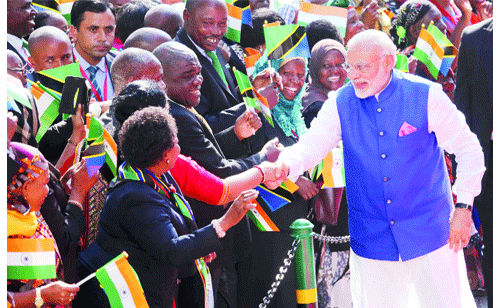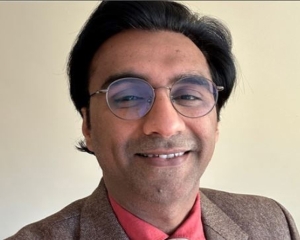While diplomatic forays to African countries are important, India must seriously engage at the sectoral level so that it can contribute to human resource development and policies that ensure equitable growth
The Prime Minister’s tour to some countries in Africa has more than symbolic importance. Much is written in the media about China’s vigorous efforts to woo African Governments and the people of that continent essentially by investing in infrastructure and mineral industries, the output of which is of great economic interest to China. It is time that India stops trying to follow the approach of keeping up with the Joneses as far as China is concerned, but rather carve out unique diplomatic and economic relationships which best suit our current situation, and most importantly suit Africa best in its own efforts to reach standards of living that lift people out of poverty on that continent. Thus far the approach followed by India, which clearly emphasises technical assistance, training and the building up of human capital in Africa is an appropriate approach as far as India-Africa relations are concerned. The Government’s Indian Technical & Economic Cooperation Programme (ITEC) has been largely successful, and the External Affairs Ministry has learned from experience and brought about some changes in the right direction.
What are Africa’s challenges, in meeting which India could become a valuable partnerIJ Population growth in Africa is very rapid and as the United Nations Population Division mentions, “More than half of global population growth between now and 2050 is expected to occur in Africa. Of the additional 2.4 billion people projected to be added to the global population between 2015 and 2050, 1.3 billion will be added in Africa.” It also states that after 2050 Africa is projected to be the only major area with continuously growing population, meaning that while it housed 25 per cent of the global population in 2010 it would account for 39 per cent in 2100. Africa’s population growth would be taking place at a time when many parts of the world actually see a decline in their own populations. Europe, for instance, will have a smaller population in 2050 than in 2015.
Africa’s phenomenal population growth clearly highlights the importance of a very different pattern of growth from what has been pursued in the developed world. If a conventional approach was followed in the aggregate, expecting a large scale trickle-down effect to help eliminate poverty, then the capital inflows, energy production and infrastructure creation that would be required would clearly exceed any reasonable chance of Africa being able to achieve these conditions. With the large number of youth that would populate the African continent, there would be a substantial need for education, and creation of entrepreneurial talent and leadership skills by which growth takes place at the grassroots level. The level of malnutrition in Africa is likely to go up unless there are significant advances in agricultural production techniques and expansion of agriculture as an activity. The term “land grabbing” has been used by the media globally to describe countries deficient in agriculture buying up land in Africa to ensure their own food security. In some sense, while the desire of countries which have large desert areas and expanding populations, say in the Middle East, to buy land on the African continent is quite understandable, this reflects an approach somewhat similar to foreign investors buying up mining rights and investing in mining activities with high returns to the investor, but very little benefit to the population around these mining centres. Agriculture by foreign land holders is likely to be of the capital-intensive variety. The future of African agriculture lies in upgradation of techniques and practices that the small farmer can benefit from. In this context India with its vast experience in agricultural development must step up its engagement in that sector in Africa. India can set up a large-scale technical assistance programme to help farmers across the African continent by which the threat of massive malnutrition and hunger can be avoided.
Essentially, India’s approach to Africa should be based on the exercise of soft power. There are already a number of teachers in schools, colleges and universities from India, who have earned a very good name for themselves and for this country. In general, there is a high level of respect among the African population on the ability of Indians to provide education on a vast range of subjects. In the case of colleges and universities, no doubt, Indian teachers could be provided as part of a development assistance programme, but at the school level an extensive teachers training programme would be of considerable value to the African continent.
Economic growth in some parts of Africa is taking place at a very healthy level, but the benefits are unevenly distributed, providing a role for poverty removal and employment generation schemes. A recent publication pointed to the fact that during the past 10 years, the gross domestic product of the 11 sub-Saharan countries increased 51 per cent, more than twice the world’s 23 per cent, and almost four times the 13 per cent expansion of the US. This has been accompanied by stabilising inflation across the continent, with the Consumer Price Index declining to 7.8 per cent from a level greater than 13 per cent in 2008. Bloomberg’s data shows that the continent’s Consumer Price Index has remained less than eight per cent since 2013. High rates of growth and low inflation levels are undoubtedly attractive to foreign investors, and countries such as Kenya and Nigeria have been successful in attracting foreign investments on a significant scale. As the economy develops, there will be a gradual transition from basic industries and mining to larger production of consumer goods and services. This is where Indian investors would find it attractive to set up manufacturing facilities at least in some parts of Africa to take advantage of low wages and surplus manpower, and an expanding market.
Overall, therefore, while diplomatic forays to African countries are important to ensure that India’s presence on that continent and a desire for economic partnership gainsvisibility, more importantly there has to be a serious level of engagement at the sectoral level by which partnerships can be established involving Government and business organisations as well as academic institutions, so that India is able to contribute effectively to human resource development, the generation of entrepreneurial skills and policies that ensure equitable growth. One area in which Africa faces a serious challenge is in respect of energy scarcity on the continent. The United Nations initiative entitled “Sustainable Energy for All” has a major opportunity in Africa for a totally different form of energy production and supply.
The largest number of this deprived community lives in Africa and South Asia. Jean-louis Borloo, former Minister in President Sarkozy’s Cabinet has launched a major programme “Energies pour l’Afrique”, which has the endorsement of all the leaders of Africa and rightly emphasises large scale spread of renewable energy solutions across the continent. A similar approach has been enunciated in the Africa Progress Report, an annual publication, the compilation of which is overseen by a distinguished set of leaders drawn from across the globe. The African energy challenge can be interpreted as a challenge to provide energy access on a decentralised basis to the vast population of the continent which lives outside the towns and cities or on the fringes of urban locations.
It was in 2007 that The Energy and Resources Institute (TERI) launched the “lighting a Million lives” campaign at the Clinton Global Summit in New York which initially focused on providing renewable energy access to a million people. This was then raised in 2008, when in the presence of the Prime Minister of India TERI launched its campaign on “lighting a Billion lives”, which was implemented in recognition of the fact that 1.3 billion people in the world even today have no access to electricity. India and institutions like TERI can play an important role in advancing relevant renewable energy programmes in Africa.
It would be particularly useful if a group of enlightened citizens with the blessings of the Government of India were to initiate an effort and convene a set of meetings in which a clear and enlightened mapping of India’s partnership with Africa can be achieved, which then becomes the roadmap for all stakeholders including the Government. Establishing a forward looking approach and creating multiple partnerships will have benefits for both sides, and as Africa develops economically, tradebetween India and Africa would grow with mutual benefits for all concerned.
(The writer is former chairman, TERI)
























